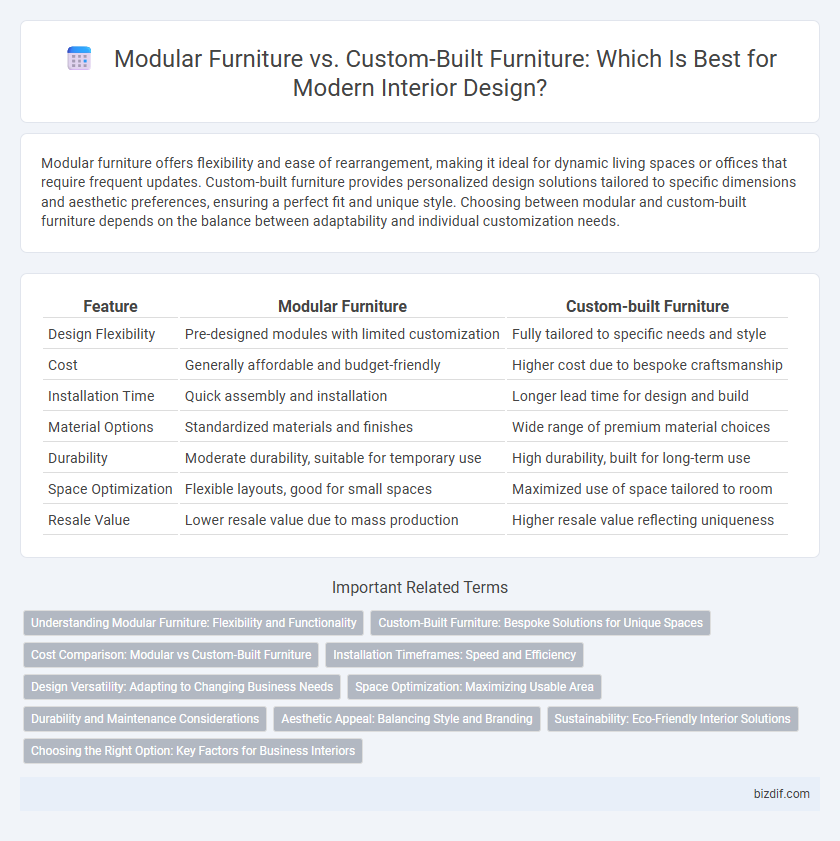Modular furniture offers flexibility and ease of rearrangement, making it ideal for dynamic living spaces or offices that require frequent updates. Custom-built furniture provides personalized design solutions tailored to specific dimensions and aesthetic preferences, ensuring a perfect fit and unique style. Choosing between modular and custom-built furniture depends on the balance between adaptability and individual customization needs.
Table of Comparison
| Feature | Modular Furniture | Custom-built Furniture |
|---|---|---|
| Design Flexibility | Pre-designed modules with limited customization | Fully tailored to specific needs and style |
| Cost | Generally affordable and budget-friendly | Higher cost due to bespoke craftsmanship |
| Installation Time | Quick assembly and installation | Longer lead time for design and build |
| Material Options | Standardized materials and finishes | Wide range of premium material choices |
| Durability | Moderate durability, suitable for temporary use | High durability, built for long-term use |
| Space Optimization | Flexible layouts, good for small spaces | Maximized use of space tailored to room |
| Resale Value | Lower resale value due to mass production | Higher resale value reflecting uniqueness |
Understanding Modular Furniture: Flexibility and Functionality
Modular furniture offers unparalleled flexibility by allowing individual pieces to be rearranged or added based on changing spatial needs, making it ideal for dynamic living and work environments. Its functionality is enhanced through standardized components that ensure easy customization without sacrificing consistency in design or quality. Unlike custom-built furniture, modular designs provide cost-effective solutions with quick installation and adaptability, perfect for modern interior design projects emphasizing versatility.
Custom-Built Furniture: Bespoke Solutions for Unique Spaces
Custom-built furniture offers bespoke solutions tailored to unique spaces, ensuring perfect fit and functionality that modular furniture cannot match. This approach leverages high-quality materials and craftsmanship to create personalized designs reflecting individual style and specific spatial constraints. Custom-built pieces enhance interior aesthetics by maximizing space utilization and integrating seamlessly with the architectural elements of a home or office.
Cost Comparison: Modular vs Custom-Built Furniture
Modular furniture typically offers a more cost-effective solution due to standardized production and easier mass manufacturing processes, resulting in lower upfront costs. Custom-built furniture involves higher expenses because of tailored craftsmanship, unique materials, and increased labor time, which significantly raise the overall price. For budget-conscious interior design projects, modular options provide affordability without sacrificing style, while custom-built pieces serve as premium investments for personalized aesthetics and exact spatial requirements.
Installation Timeframes: Speed and Efficiency
Modular furniture offers significantly faster installation timeframes due to its pre-fabricated components designed for quick assembly, often reducing setup to just a few hours. Custom-built furniture requires longer lead times, as designs are tailored to specific dimensions and finishes, necessitating detailed craftsmanship and on-site adjustments. Prioritizing modular furniture can enhance project efficiency, especially in commercial or fast-paced interior design environments.
Design Versatility: Adapting to Changing Business Needs
Modular furniture offers exceptional design versatility by allowing easy reconfiguration to accommodate evolving business environments and spatial requirements. Custom-built furniture delivers tailored solutions that perfectly match specific aesthetic and functional demands but may lack flexibility for future changes. Companies seeking adaptable office layouts often prefer modular systems to efficiently respond to shifting workflows and growth.
Space Optimization: Maximizing Usable Area
Modular furniture offers flexible configurations that adapt to various room sizes, maximizing usable space through compact, stackable, and multi-functional designs. Custom-built furniture is tailored precisely to fit unique room dimensions and specific storage needs, ensuring no space goes unused. Both approaches optimize space effectively, but modular units provide versatility while custom-built pieces deliver personalized efficiency.
Durability and Maintenance Considerations
Modular furniture offers flexibility and ease of replacement, often constructed from engineered materials that balance durability with affordability, requiring minimal maintenance through simple part swaps. Custom-built furniture typically utilizes solid wood or high-quality materials, enhancing longevity and offering tailored finishes that demand regular upkeep such as polishing and repair to maintain its premium appearance. Durability in custom-built pieces tends to surpass modular options due to craftsmanship, while maintenance demands align with chosen materials and design complexity.
Aesthetic Appeal: Balancing Style and Branding
Modular furniture offers cohesive aesthetic appeal by allowing interchangeable pieces that align with evolving brand identities and contemporary design trends. Custom-built furniture enhances unique style expression through tailored craftsmanship and materials that reflect specific brand narratives and spatial requirements. Balancing both options involves evaluating the flexibility of modular designs against the distinctiveness and personalization inherent in custom-built creations.
Sustainability: Eco-Friendly Interior Solutions
Modular furniture often incorporates sustainable materials and promotes resource efficiency through standardized components and easy disassembly, reducing waste and enabling recycling or repurposing. Custom-built furniture can be crafted from reclaimed or locally sourced wood, minimizing carbon footprint while offering personalized, durable solutions that last longer and require fewer replacements. Both options contribute to eco-friendly interior design by balancing environmental impact with functionality and aesthetic appeal.
Choosing the Right Option: Key Factors for Business Interiors
Modular furniture offers flexibility and cost-efficiency, ideal for dynamic business environments requiring frequent reconfiguration and scalability. Custom-built furniture provides tailored solutions with superior craftsmanship, enhancing brand identity and maximizing space utilization in unique office layouts. Key factors to consider include budget constraints, design requirements, space optimization, and long-term maintenance when selecting between modular and custom-built options for business interiors.
Modular furniture vs Custom-built furniture Infographic

 bizdif.com
bizdif.com